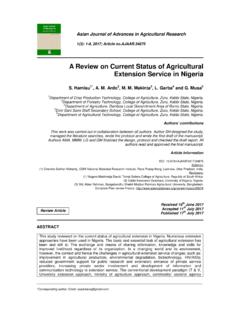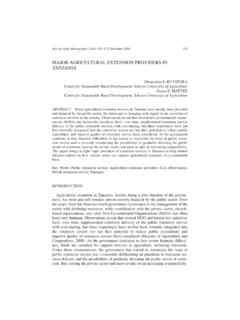Transcription of Home Care CDC Policy Elements and Guideline May 2013 ...
1 national AGED care alliance home care CDC Policy Elements and Guideline May 2013. Development advisory Paper One of the fundamental aims of the Living Longer. Living Better (LLLB) reform package is to create a consumer led and directed aged care system. In its first year LLLB introduces a number of new CDC. home care packages. By 1 July 2015 all packages, new and existing, will be CDC packages. In the longer term, the reforms will design and introduce CDC in residential care . Moving to a CDC based system is a fundamental shift from how services currently operate and to how consumers experience the aged care system.
2 The national Aged care Alliance (the Alliance) has already provided advice to Government to assist in the introduction of CDC packages 'The national Aged care Alliance advice on phase one development of Consumer Directed care (CDC) home care Packages' prior to Government advertising their availability in the 2012 Aged care Approvals Round (ACAR). A number of Alliance recommendations were adopted. The Phase One advice can be viewed at: Purpose of this Paper The purpose of this paper is to provide advice to Government to: Further define the Policy and principles underpinning Consumer Directed care (CDC) packages; and Develop Program Guidelines and other information products.
3 An introductory section outlines the principles that should guide the delivery of CDC packages and be reflected in the development of the Program Guidelines. The first section of the paper provides further Policy definition and advice and is structured to reflect how consumers will experience the new home care CDC Packages. These steps include: Goal setting and care planning including a control and decision making framework, information and support;. Individualised budgets including administration, core advisory and case management, service and support provision and/or purchasing, consumer fees and charges, package leave, package turnover.
4 Service delivery including consumer/approved provider responsibilities, refusal of service provision, service inclusions/exclusions; and Monitoring, review, reassessments and evaluation. The second section of the paper provides general advice around the style and content of various information products, including: Program Guidelines for approved providers;. Information for consumers; and Other audiences. The final section of the paper outlines other issues and areas for further discussion including: AGED care alliance Transition;. Interface with other programs;. System gaps.
5 Data collection;. national Resourcing Allocation of packages to special needs groups;. Rural and remote;. Assessment; and Disclosure requirements. Specific questions posed by the Department are included throughout (in blue italics) for consideration. The provider holding the package funding, and as a result having responsibility for case management, is referred to throughout the paper as the approved provider (AP). Introduction For the shift to CDC to be successful it is likely that many APs will need to significantly change their current processes and practices. Guidelines will be produced to support and encourage APs to make these changes.
6 These guidelines should include the following principles for the operation and delivery of CDC packages: Consumer Choice and Control Consumers have managed their own lives for a long time. They should be empowered to continue to manage their own life by having control over the care and support they receive. This requires the provision of, and assistance to access, information about service options that enables consumers to build a package that supports them to live the life they want. Entitlement The CDC system should acknowledge older people's right, or entitlement (based on their assessed need), to the individualised services and support that will assist them.
7 Respectful and Balanced Partnerships The development of respectful and balanced partnerships between consumers and APs, which reflect the consumer and AP rights and responsibilities, is absolutely crucial to consumer control and empowerment. Part of creating such a partnership is to determine the level of control the consumer wants to exercise. This will be different for every individual with some requiring or wanting assistance and others choosing to manage on their own. Consumers should have an opportunity to work with the AP in the design, implementation, and monitoring of a CDC approach and cultural change in the AP organisation.
8 APs should be encouraged to include consumers in their CDC redesigns. home care CDC Policy Elements and Guideline Development advisory Paper - May 2013 2. Participation AGED care alliance Community and civic participation are important aspects for wellbeing. CDC in aged care should support the removal of barriers to participation for older people. Wellness and Reablement CDC packages should be offered within a restorative or reablement framework to enable the national consumer to be as independent as possible, potentially reducing the need for ongoing and/or higher levels of service delivery.
9 Many people enter the aged care system at a point of crisis. Such situations may require the initial provision of services designed to address the immediate crisis. However, there should always be an assumption that the older person can regain their previous level of function and independence with reablement services being offered at a time that suits/supports the individual circumstances. Transparency Under a CDC system, older people have the right to use their budgets to purchase the services they choose. To make informed decisions about their care , older people need to have access to budgeting information, including the cost of services, the contents of their individualised budgets and how their package funding is spent.
10 Recommendation 1: home care Package Guidelines should incorporate the above CDC principles as requirements for all service provision. Policy Definition and Advice A. Goal Setting and care Planning The AP's role is to work with the older person to identify their goals and assist them in determining how they can achieve them. Goal setting and care planning should be undertaken in partnership and emphasise: Consumer choice and control;. Support for consumer decision-making;. Wellness and reablement; and Maintenance of independence and continuation of participation in community.








